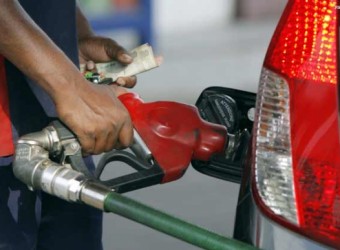The General Transport Petroleum and Chemical Workers Union (GTPCWU) of TUC (Ghana) has called on Government to reduce taxes on petroleum product to ease the burden of all Ghanaians.
According to the workers, wages have remained the same despite the astronomical increase in fuel prices coupled with the increase in communication tax..
According to the union, the impact of the increase has been unbearable thereby worsening the standard of living of the ordinary Ghanaian.
They added that Ghanaians are struggling as a result of the frequent hikes in fuel prices.
The National Chairman for the General Chairman for Petroleum and Chemical Workers Union of the TUC, Mr Bernard Owusu further called on the government to take a strong position in rectifying the situation without any further delay.
“We are paying almost Gh₡ 4 per gallon. And Looking at the number of taxes that we are already embedded with, coupled with core tax, we think the government should not just get up and just increase petroleum prices to that level. We think is not right, and the Government has to look at it and reduce it.
Background
In a statement, the Union reminded the government to be mindful of the implications of these sharp increases in taxes on Ghanaians and take steps to relieve them.
“The fuel price increase is coming from the many taxes and fees that are being levied on Ghanaians. The taxes are high and too many leading to a worsening of the living standards of Ghanaians. The tax on fuel alone is between 40%-45% of the fuel price. Government must immediately reduce the tax to lessen the burden on Ghanaian workers. ”
“Fuel prices are being increased indiscriminately. This development does not bode well for the living conditions of workers, their families, and Ghanaians in general and it must be halted”, the statement added.
We call for decorous discussions about ending the suffering of workers and Ghanaians. The government must seek to fulfill its promise of making the lives of Ghanaians better.
“We are calling for a reduction in the taxes to ease the difficulties of workers. We hope and believe that this piece will go a long way to send a signal to government on the appalling and harsh conditions faced by the Ghanaian worker and the society, in general, to enable it to take a position to rectify them without delay. “
It emerged that, pump prices have shot up from the previous GHc 5.19 per litre to about GHc5.39 for a litre representing a 3.7% jump in previous figures at the pumps.
Energy think tank, the Chamber of Petroleum Consumers (COPEC) attributed the recent fuel hike to the increase in some components of the energy sector levies.
COPEC in the statement insisted that the fuel increases should be reversed to reduce the plight of petroleum users.
High fuel prices vs. low salaries
The group also contended that the Ghanaian worker has not seen the same percentage increases in wages and that, its yearly comparison shows that fuel price changes have been astronomical thereby eroding the purchasing power of workers.
“The meager salaries received by workers coupled with increased taxes on PAYE, water, electricity, and communication is detrimental to the welfare of Ghanaian workers and their families. At the same time, workers and Ghanaians cannot link the higher taxes that confront them with any appreciable improvements in basic economic and social circumstances of the country.”
‘NPP gov’t has developed so much appetite for taxation’
Already, the Minority in Parliament has demanded a withdrawal of the recent upward review of taxes on petroleum products.
It says such a move will bring down the prices of fuel and other petroleum products.
Some Oil Marketing Companies increased the price of fuel due to the tax adjustments to the ESLA levies.
Adam Mutawakilu who is a Ranking Member of Parliament’s committee on Mines and Energy said the recent increase in fuel prices cannot be justified.
“Government has been blaming all these increments on international crude oil price and the depreciation of the cedi. But, what makes this one different and more insensitive is the fact that this is not a result of international crude oil prices or exchange rates issues, it is the imposition of more taxes. The government when in opposition, propagandized and captured in their manifesto that they were moving this country from taxation to production but all of a sudden it has developed so much appetite for taxation”, he criticized.







